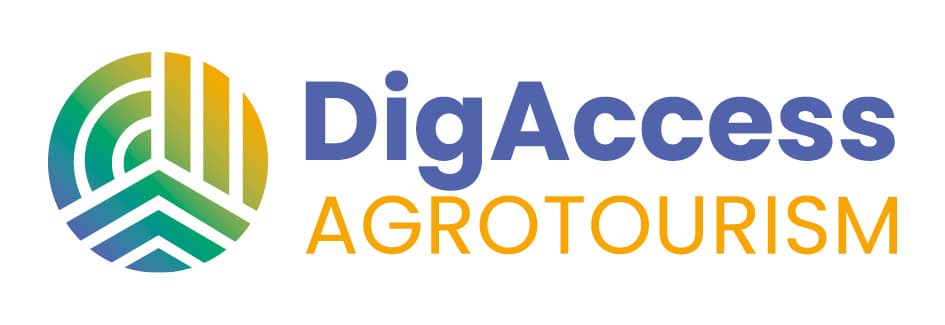
Inside the Project
COMMENTS

Towards Rural Tourism for All: Inside the DigAccessAgrotourism Project
Can rural tourism become truly inclusive? A new EU-funded initiative is determined to make it happen. Meet DigAccessAgrotourism—an ambitious project funded by the COSME programme that’s helping agrotourism businesses across Europe open their doors wider to people with disabilities.
Tourism for All? Not Yet.
Tourism is one of Europe’s strongest economic drivers, yet for millions of people, travel remains a challenge. For the estimated 15% of the global population with disabilities—over 1 billion people worldwide—simply booking a trip or accessing basic information can be a major hurdle. In Europe alone, more than 80 million people live with a disability.
The barriers are even higher in rural tourism, where infrastructure often lags behind. While visitors head to the countryside to immerse themselves in local traditions, nature, and slower lifestyles, persons with physical, sensory, or cognitive limitations can find themselves excluded from the experience.
And it’s not just about equity, accessibility is good business. Inclusive tourism taps into a much larger and underserved market: older adults, families with young children, people recovering from injuries, or pregnant travelers. Improving accessibility—like better transport, signage, or digital interfaces—isn’t just a moral imperative, it’s an investment in long-term economic growth.

The European Response
Recognizing this gap, the European Commission and key stakeholders have been advocating for barrier-free tourism. Yet many agrotourism businesses, particularly in rural areas, still haven’t caught up. That’s where DigAccessAgrotourism steps in.
The Project at a Glance
Launched in six countries—Belgium, Greece, Italy, Portugal, Poland, and Cyprus—the project brings together a strongly committed and diverse partnership: OIC Poland Foundation, EUROSUCCESS, Legacoop Emilia-Romagna, FENACERCI, the Greek-Italian Chamber of Commerce, the Cyprus Agrotiurism Company, and ARFIE Network.
What unites them? A shared goal: to boost digital transformation in the agrotourism sector and make rural experiences accessible to all, especially people with disabilities.
A Plan to Transform
The DigAccessAgrotourism project tackles several key challenges:
• Mapping Needs: Understanding the digital and accessibility gaps in agrotourism SMEs and support organisations.
• Upskilling the Sector: Rolling out training, mentoring, and advisory support to help agrotourism providers adopt technologies like IoT and data-driven tools.
• Empowering Enablers: Equipping “enabling organisations”—those that support SMEs—with the know-how to guide digital transitions across the sector.
• Engaging Operators: Involving SMEs from the Social Economy operating in rural areas directly in project activities to ensure on-the-ground impact.
The mission is simple: use digital tools to break down barriers and make rural tourism more inclusive, more sustainable, and more resilient.
Aligned with the EU Strategy
DigAccessAgrotourism doesn’t operate in a vacuum. It’s tightly aligned with major EU goals, including:
• Supporting the digital transition of small and medium-sized enterprises (SMEs) in the social economy;
• Strengthening the social economy’s role in digital innovation;
• Advancing the European Industrial Strategy and the Social Economy Action Plan;
By empowering rural tourism businesses with the digital skills and tools they need, the project supports both economic growth and social inclusion—the twin pillars of a modern, equitable Europe.
What’s Next?
The project is just getting started. Partners are currently in the field, conducting assessments and identifying needs of the agrotourism sector in terms of digital transitions regarding accessibility of SMEs in the agrotourism sector & enabling organisations in the social economy. These activities are part of the Work Package n2 Work, which focuses on mapping the needs of SMEs and Enabling Organisations and identifying and mapping the digital needs and opportunities of agrotourism SMEs and enabling organisations regarding accessibility. Through extensive research across partner countries, partners will collect insights from 100 agrotourism SMEs and 16 enabling organisations, analyzing their challenges in digital transition. Additionally, WP2 will gather 20 best practices and digital solutions at the EU and national levels, supporting accessibility improvements in the agrotourism sector. The findings will contribute to the development of a structured framework, guiding future capacity-building activities to enhance digital accessibility and inclusion in the industry. These findings will be presented and discusses on the occasion of our forthcoming Webinar at the end of May, don’t miss the opportunity to register here!
The vision is clear: a Europe where everyone, regardless of ability, can experience the richness of rural life. Inclusion isn’t a luxury. It’s the future of tourism.



No comments yet
You must be logged in to leave a comment